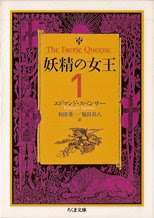だが騎士の胸当には、主の受難の尊い形見の
血の十字架がつけてあり、この主のために
daga kishi no munea ni wa, shu no junan no toutoi (?) katami no
chi no juujika ga tsukete ari, kono shu no tame ni
Seasons Greetings, my insane followers of this insane blog. I had to take time off to grade yet more exams and then relax for a bit. Today I found some time to translate the first two lines of the second stanza of the first canto of the first book, which is shown in the usual notation in the post title as it will henceforth be indicated in the posts themselves.
Let's try a translation without the aid of the original:
だが - conjunction (helpfully glossed as そして soshite, which means "and")*
騎士 - we know this one! knigget!
の - possessive particle
胸当 - breastplate, usually 胸当て according to my dictionary
に - either an indirect object, some other "dative" meaning, or I don't know (locative?)
は、- topic particle
主 - Lord (i.e. Jesus Christ)
の
受難 - suffering, agony, passion
の
尊い - annoying word pronounced either たっとい tattoi or とうとい toutoi; I have no idea which one to use here, and I have no idea how Japanese people would have any idea, either
形見 - memento
の
血 - blood
の
十字架 - crucifix (seen earlier in the argument)
が - subject particle
つけて - could be many things, possibly the て form of the verb 着ける which has about twelve meanings, few of which are synonymous (I think it's "to wear")
あり、- not sure... maybe "aru" in base 2 or whatever it's called (stem 2?)**
この - this
主 - Lord
の
ために - on behalf of, for
* actually, the note seems to say that そして was used in the 初版 or first edition (of this translation?), not that the word used here has the same meaning, so let's translate this instead as "but"
** update - I suspected this might be the て + aru form I learned about but seldom see, so I looked it up in a grammar guide to confirm. In this case, the "aru" might be in base 2 form in anticipation of a verb I haven't gotten to yet
I need to cut and paste the Japanese again to translate. You are really experiencing my process here:
だが騎士の胸当には、主の受難の尊い形見の
血の十字架がつけてあり、この主のために
But as for on the breastplate of the knight, a crucifix of blood of a holy reminder of the suffering of the Lord has been affixed, for this Lord...
The next "main verb" I can find is 輝く, かがやく, "to glitter" which doesn't seem helpful. The sentence itself doesn't end for another two lines, so we may have to wait to get the full sense here. Obviously, the meaning is something along the lines of:
But on the knight's breast emblazoned was a bloody cross, a holy reminder of the passion of Christ.
Finally, for budding Spenser fans, here is the original:
But on his brest a bloudie Crosse he bore,
The deare remembrance of his dying Lord,
Hey, I think I did pretty damn well that time! I think I'm going to reward myself by making some homemade vegetarian phở.
12.29.2008
Subscribe to:
Post Comments (Atom)





No comments:
Post a Comment